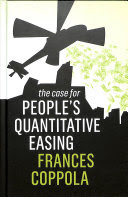Last night, the Resolution Foundation hosted a debate to launch my book, "The Case for People's Quantitative Easing". A great panel consisting of Jagjit Chadha, Director of NIESR; Fran Boait, Executive Director of Positive Money; and James Smith, Research Director of the Resolution Foundation, debated my ideas with immense verve, ably moderated by Torsten Bell, Chief Executive of the Resolution Foundation. You can watch the debate here.In 2008, QE did a great job of supporting asset prices and preventing the disastrous deflationary spiral of the 1930s. But since then, enormous quantities of asset purchases by central banks around the world have proved unable to raise aggregate demand and kickstart growth.Although central banks didn't do a bad job in the last recession, many of the tools
Topics:
Frances Coppola considers the following as important: People's Quantitative Easing, PQE, QE
This could be interesting, too:
Frances Coppola writes How to use People’s QE to fight climate change
Frances Coppola writes David and Goliath
Frances Coppola writes Reconciling IS-LM and endogenous money
Sergio Cesaratto writes E qui comando io…
In 2008, QE did a great job of supporting asset prices and preventing the disastrous deflationary spiral of the 1930s. But since then, enormous quantities of asset purchases by central banks around the world have proved unable to raise aggregate demand and kickstart growth.
Although central banks didn't do a bad job in the last recession, many of the tools they used won't work in the next one, not least because the legacy of the tools themselves has not yet dissipated. Interest rates are on the floor, central bank balance sheets are enormous, and the private sector is still weighed down with debt. When the next recession hits, central banks will need more radical tools to support aggregate demand.
"Helicopter money" - distributing money to ordinary people - would provide a more effective short-term aggregate demand stimulus than QE, without its unfortunate distributional consequences. And governments can, by taking advantage of central banks' ability to support asset prices, invest in their economies to restore growth and rebalance the economy over the longer term.
But to make it work, governments and central banks need to cooperate. No monetary stimulus can be effective if the government is determinedly extracting money from the private sector as fast as the central bank is pouring it in. This raises questions about the relative responsibilities of central bank and Treasury, the limits of monetary policy, and the democratic and institutional framework within which aggregate demand management must work. When fiscal and monetary policy are blurred, can there really be effective separation of central bank and Treasury?
The book also discusses longer-term use of "people's QE" to support government efforts to address the triple challenges of climate change, an ageing population, and automation.
"The Case For People's Quantitative Easing" is currently available for readers in the UK and Europe - Amazon link is here. It will be released in the U.S. in September.

